Padrinos
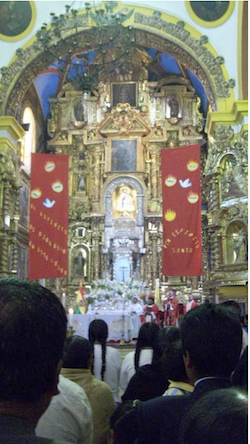 Bless the local vendors, who are patient with our rough Spanish. We teach them a little English. They love teaching us Aymara, the local indigenous language. We all laugh.
Bless the local vendors, who are patient with our rough Spanish. We teach them a little English. They love teaching us Aymara, the local indigenous language. We all laugh.
Two weeks ago, two of our favorite vendors, Roxana and Hugo, who live in a small apartment behind their tiny-but-packed-to-the-ceiling house wares shop, surprised us with a visit to our house. (Dang it: I had just stepped out of the shower, wrapped in a towel! I sorted myself out and joined them and Jeff.)
They surprised us again: Would we serve as godparents to their two teenagers?
In Latin America, this is a serious request -- and a hefty obligation for godparents. Roxana and Hugo said they want their kids to have “a second set of parents” to model the value of an education, hard work, and resourcefulness; to demonstrate a virtuous life; and to lead Katarina and Franzua toward a better life.
Gulp.
We said Yes.
They reached into a black plastic bag and handed us a freshly killed chicken. Hugs and kisses all around … followed by some worry on our part. Can we Methodists serve as godparents to Catholic confirmands? Yes, but Roxana told us the church secretary had been quite skeptical – she had asked: they’re Americans? Living here? Are you sure? The secretary asked the same questions a week later. She sought the bishop’s counsel. He gave his blessing.
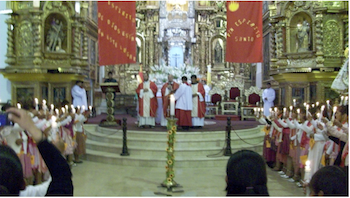 Then we hammered out ceremony details: When to meet, what to wear, what’s expected of us … We did a little legwork on our own and learned that traditional Bolivian confirmation gifts are a red candle in La Paz, but here in Copa, it’s a white candle, a Bible, and clothing. Or just cash. We also learned that godparents, “padrinos” in Spanish, traditionally host the grand celebration dinner afterward. Roxana and Hugo wanted the party to be at our house, but said they’d bring food.
Then we hammered out ceremony details: When to meet, what to wear, what’s expected of us … We did a little legwork on our own and learned that traditional Bolivian confirmation gifts are a red candle in La Paz, but here in Copa, it’s a white candle, a Bible, and clothing. Or just cash. We also learned that godparents, “padrinos” in Spanish, traditionally host the grand celebration dinner afterward. Roxana and Hugo wanted the party to be at our house, but said they’d bring food.
A few days later, Roxana brought the kids by so we could all get acquainted. Katarina, 13, stepped inside, said “Wow!” and wrapped us in hugs and kisses. She has a 500-watt mind, and speaks about 500 words per minute. In Spanish. Next to her, Franzua got enough air space to tell us he likes computers. She jumped in: he likes some sports, but her taste for sports is broader. She also likes reading, music, and singing. And history. “The Incas are fascinating …”
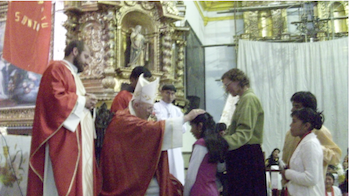 The bishop presided at the confirmation, which was held in the world-famous Copacabana Cathedral of the Dark Virgin of the Lake. People from all over the world visit this fabulous, white, Moorish-style Cathedral, built 1547-1662. Three- and 400-year-old oil paintings; elaborately painted statues; and gilt, filigreed frescoes crowd the walls and ceiling of the nave. The chancel gleams with 30,000 pounds of Incan gold and silver.
The bishop presided at the confirmation, which was held in the world-famous Copacabana Cathedral of the Dark Virgin of the Lake. People from all over the world visit this fabulous, white, Moorish-style Cathedral, built 1547-1662. Three- and 400-year-old oil paintings; elaborately painted statues; and gilt, filigreed frescoes crowd the walls and ceiling of the nave. The chancel gleams with 30,000 pounds of Incan gold and silver.
We look a lot different than local people. Heads turned, but the faces were smiling. I wore a falda, a traditional, long, Aymara skirt. People nodded, pointed and smiled approvingly.
Since we didn’t know the kids well, and don’t know the Bolivian sizing system at all, we decided to make cards and give them cash. At the post-ceremony dinner, the kids opened their cards and discovered the cash – 200 bolivianos, a little less than $30 USD. Their eyes went wide. Clearly nervous at handling, or just seeing, so much money, they promptly handed it to Roxana.
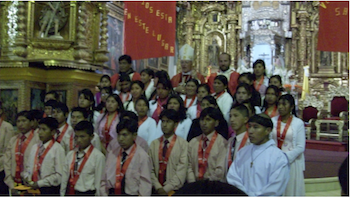 Even though Roxana and Hugo had promised to bring food, we wanted to contribute, especially since we had two guests, another missionary and a Bolivian friend who wanted to see a Catholic confirmation ceremony. So we bought and filleted two big trout (trout from Lake Titicaca is THE big specialty of this area, always served at celebration meals). We made fancy potato and vegetable pancakes, Asian lettuce wraps (a surprise for the Bolivianos!), and spiced, toasted garbanzo beans as a snack.
Even though Roxana and Hugo had promised to bring food, we wanted to contribute, especially since we had two guests, another missionary and a Bolivian friend who wanted to see a Catholic confirmation ceremony. So we bought and filleted two big trout (trout from Lake Titicaca is THE big specialty of this area, always served at celebration meals). We made fancy potato and vegetable pancakes, Asian lettuce wraps (a surprise for the Bolivianos!), and spiced, toasted garbanzo beans as a snack.
But that menu was eclipsed.
The moment we all got home after the service, Roxana, Hugo, and the kids, including their older brother, Hugo, carried in from their van chairs, plates, bowls, utensils, soft drinks, and napkins. A small stool materialized. Roxana perched on it and promptly prepared a mountainous salad. Pots and bowls appeared. From them, Roxana whipped out nine plates towering with the salad, rice, boiled potatoes, black potatoes, chuño (a dried white potato), oka (a finger-sized Bolivian tuber that tastes like roasted chestnuts), and spicy, roasted pork chops Hugo had cooked in a wood-burning, adobe oven.
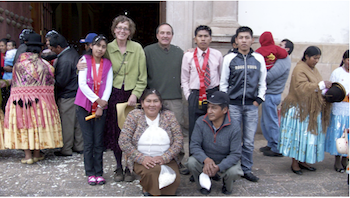 We talked about family, politics and religion, church and faith, the cost of living, life in the States, and life in Bolivia. We talked about cooking, kids’ education, and traffic here compared to traffic in the States. We talked about Aymara women’s bowler hats and where that tradition came from. Six Bolivianos and three Americans learned a lot about one another and each others’ cultures.
We talked about family, politics and religion, church and faith, the cost of living, life in the States, and life in Bolivia. We talked about cooking, kids’ education, and traffic here compared to traffic in the States. We talked about Aymara women’s bowler hats and where that tradition came from. Six Bolivianos and three Americans learned a lot about one another and each others’ cultures.
Interchange is one of the four fundamental goals of Mision Fronteras. Six months ago we wouldn’t have guessed we’d do that inside a Catholic Cathedral, and over a confirmation celebration dinner. What an honor!
Please visit our recently updated website at: www.misionfronteras.com
To donate please visit The Advance at:
http://new.gbgm-umc.org/advance/projects/search/index.cfm?action=details...
- Debbie Rissing's blog
- Log in to post comments
God, as known to us in Jesus Christ, welcomes all.
We welcome people of any race, national origin, ethnicity, gender, sexual orientation, age, social or economic status, employment status, or life situation; including people with physical or mental illness or disability.
We practice loving acceptance of each person and respectful discussion
 of our differences.
of our differences.
Affiliated to Reconciling Ministries Network
Recent News
Sunday Worship Service - July 30 at 10:00 am
July 30, 2023 - 9:51am
Sunday Worship Service - July 23 at 10:00 am
July 23, 2023 - 9:48am
Sunday Worship Service - July 16 at 10:00 am
July 16, 2023 - 10:17am
Vacation Bible School
July 14, 2023 - 10:10pm
Sunday Worship Service - July 9 at 10:00 am
July 9, 2023 - 9:53am






